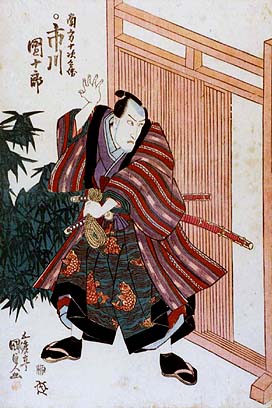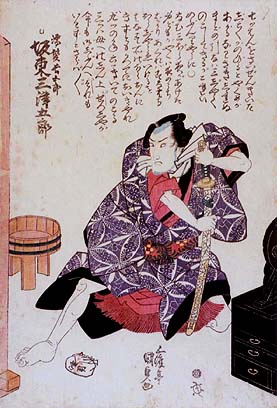| HIKIMADO |
| Play titles | Futatsu Ch˘ch˘ Kuruwa Nikki A Diary of Two Butterflies in the Pleasure Quarters [1] |
| Common title | Hikimado |
| Authors | Takeda Izumo II Namiki Senryű I Miyoshi Sh˘raku |
| History | The play in nine acts "Futatsu Ch˘ch˘ Kuruwa Nikki" was originally written for the puppets theater and performed for the first time in the 7th lunar month of 1749 at the Takemotoza in ďsaka. It was adapted for Kabuki a few weeks later by the zamoto Arashi San'emon IV in the 8th lunar month of 1749 in Ky˘to. The roles of the 2 sum˘ wrestlers Nuregami Ch˘gor˘ and Hanaregoma Ch˘kichi were played by the actors Nakayama Shinkur˘ I and Fujikawa Heikur˘. |
| Structure | The "Yawata Sato Hikimado" scene, Commonly called "Hikimado", is the eighth act of the play "Futatsu Ch˘ch˘ Kuruwa Nikki". |
| Key words |
Azuma-yojibŕmono Ganjir˘ Jűnikyoku Gidayű Ky˘gen Sewamono Sum˘ Sum˘mono Sum˘tori |
| Summary |
In a previous act, Ch˘gor˘ killed a samurai out of a sense of obligation to his patron Yogor˘'s father. Now Ch˘gor˘ is an infamous criminal wanted by the police. He calls on his real mother, Ok˘, who has remarried and lives in rural Yahata with her foster son, Nan Yohŕ, and his wife, Ohaya. Ch˘gor˘ intends to surrender himself to the law after one final meeting with his mother. Ok˘ and Ohaya receive him warmly. Then Ok˘ listens to his whole story. Having been summoned by the local magistrate, however, Yohŕ is out. To his great joy Yohŕ is allowed to inherit both his deceased father's name, Nanp˘ Jűjibŕ, and his duties. From the time of his father's death until this moment, he has had to be satisfied with his lowly status as a poor merchant. Now he has become a fine, respectable policeman. Ironically, his first assignment is to arrest Ch˘gor˘, the foster brother he has never met. The manhunt for Ch˘gor˘ is being carried out round-the-clock. While another party takes charge of the search in the daytime, Jűjibŕ is ordered to conduct it at night. He receives from the magistrate his truncheon and a personal description of Ch˘gor˘. Still unaware that his foster brother is the very person wanted by the police, Jűjibŕ returns home triumphantly. When Jűjibŕ arrives home, Ch˘gor˘ keeps out of his sight. Ok˘ asks him about the personal description that is being circulated, so that Ch˘gor˘ can disguise himself and escape from the village without being recognized. Jűjibŕ becomes vaguely aware of the presence of someone upstairs. Ostentatiously he announces, "It's night. It is about time I went out to do my duty." He leaves the house and quietly goes round to the back yard with the intention of arresting the intruder, whom he now supposes is Ch˘gor˘. Yet as he eavesdrops on Ok˘ and Ch˘gor˘, he gradually comes to have compassion for Ch˘gor˘. He realizes that Ch˘gor˘ must have suffered countless hardships as an orphan, while he enjoyed a happy life with loving parents who provided him with everything. Finally, he resolves to let Ch˘gor˘ go, even at the sacrifice of his post. When Jűjibŕ allows Ch˘gor˘ to make his escape, it is night. In those days it was the custom to close the skylight shutters at night. Jűjibŕ takes full advantage of the custom to rationalize his actions. As it gets darker and darker and his wife is about to shut the door of the skylight, he makes sure that Ch˘gor˘'s escape route remains open by calling out, "It is too early to close the shutters. It is still daytime." The implication, since his duty begins only at night, therefore, is that he need not arrest his foster brother. He used the door as a pretext to escape his duty. As the keyword of the drama--often repeated by Jűjibŕ, his wife, and Ok˘-- "hikimado" (skylight) has become the name of this drama. This summary has been written by Watanabe Hisao and edited by Jeff Blair [website] |
| Notes |
[1] The title "A Diary of Two Butterflies in the Pleasure Quarters" comes from the 1st volume of "Kabuki Plays On Stage". |
 |
 |
|
The actors Ichikawa Danjűr˘ VII and Band˘ Mitsugor˘ III playing the roles of Nanp˘ Jűjibŕ and Nuregami Ch˘gor˘ in the "Hikimado" scene of the play "Futatsu Ch˘ch˘ Kuruwa Nikki", which was staged in the 9th lunar month of 1824 at the Ichimuraza (print made by Utagawa Kunisada I) |
|
|
|
| Contact | Main | Top | Updates | Actors | Plays | Playwrights | Programs | Links | FAQ | Glossary | Chronology | Illustrations | Prints | Characters | Derivatives | Theaters | Coming soon | News |